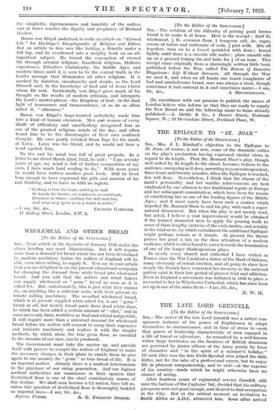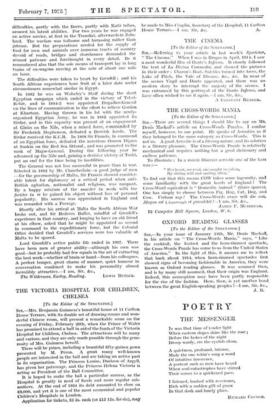THE LATE LORD GRENIELL
[To the Editor of the SPECTATOR.] Sm,—The career of the late Lord Grenfell was a rather con- spicuous instance of the power of Englishmen to adapt themselves to circumstances, and in time of stress to exert that power of leadership characteristic of men engaged in .a life of travel or adventure. As remarked by a -well-known writer large territories on the frontiers of British dominion are governed by junior officers of the Army purely by force of character and "in the spirit of a summer's holiday." Of such fibre -was the late Field-Marshal who joined the 00th Rifles, not for the sake of a professional -career, 'but to enjoy life in pleasant companionship, and to visit—at the expense -of his country—lands which he might otherwise have no chance of seeing.
After fourteen years of regimental service Grenfell, still
near the bottom of the Captains' list, decided that his -military prospects were not good enough, and desired to find occupation in the City. But at the critical moment an invitation to South Africa as A.D.C. attracted him. Soon after arrival
diffieulties, partly with the Boers, partly with Kafir tribes, aroused his latent abilities. For two years he was engaged on active service, at first in the Transkei, afterwards in Zulu- land. The warfare was toilsome and harassing rather than intense. But the preparations needed for the supply of food for men and animals over immense tracts of country devoid of roads, bridges and storehouses demanded the utmost patience and forethought in every detail. Be it remembered also that the sole means of transport lay in long trains of ox-wagons moving at the rate of about one mile an hour.
The difficulties were taken to heart by Grenfell ; and his 'South African experiences bore fruit at a later date under circumstances somewhat similar in Egypt.
In 1882 he was on Wolseley's Staff during the short Egyptian campaign which ended in the victory of Tel-el- Kebir, and in 1884-5 was appointed Brigadier-General on the lines of communication in the effort to relieve Gordon at Khartum. Having thrown in his lot with the newly- organized Egyptian Army, he was in 1885 appointed its Sirdar, and in this capacity was present at an engagement at Giniss on the Nile, when a mixed force, commanded by Sir Frederick Stephenson, defeated a Dervish horde. The Sirdar received the K.C.B. In 1888 Sir Francis, in command of an Egyptian force, defeated the notorious Osman Digma at Suakin on the Red Sea littoral,, and was promoted to the rank of Major-General. During the following year he advanced up the Nile and, gaining a decisive victory at Toski, put an end for the time being to hostilities.
The General was not less successful in peace than in war. Selected in 1892 by Mr. Chamberlain—a good judge of men --for the governorship of Malta, Sir Francis showed consider- able talent for diplomacy at a critical period when anti- British agitation, nationalist and religious, was rampant. By a happy mixture of the suaviter in modo with the fortiter in re he gained his object without loss of personal popularity. His success was appreciated in England and was rewarded with a Peerage.
Shortly after his arrival at Malta the South African War broke out, and Sir Redvers Buller, mindful of Grenfell's experience in that country, and longing to have an old friend at his elbow, asked that he might be appointed as second in command to the expeditionary force, but the Colonial Office decided that Grenfell's services were too valuable at Malta to be spared.
Lord Grenfell's active public life ended in 1907. There have been men of greater ability—although his own was good—but he probably had few equals in the art of extracting the best work—whether of brain or hand—from his colleagues. A perfect temper, great charm of manner, quiet humour in conversation combined to make his personality almost incredibly attractive.-1 am, Sir, &c.,
The Wilderness, Earley, Reading. LEWIS BUTLER.











































 Previous page
Previous page